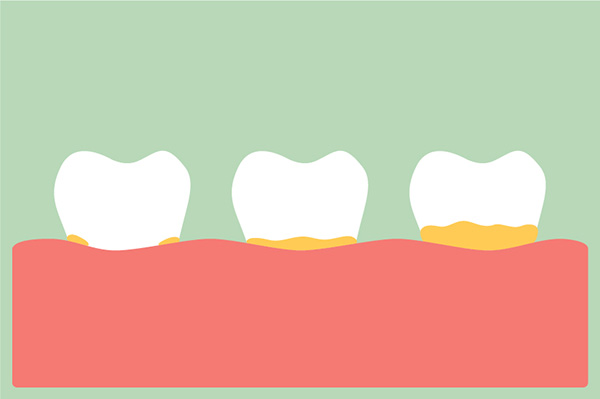 Receding gums can be the result of plaque build-up underneath gum tissues. The bacteria in plaque can infect tissues underneath the gums, activating the body’s inflammatory response. The inflammation leads to gum tissues pulling back from teeth roots, exposing said roots to acids made by oral bacteria.
Receding gums can be the result of plaque build-up underneath gum tissues. The bacteria in plaque can infect tissues underneath the gums, activating the body’s inflammatory response. The inflammation leads to gum tissues pulling back from teeth roots, exposing said roots to acids made by oral bacteria.
Teeth roots do not have the luxury of being protected by enamel, the most durable substance in the body. They are covered with cementum, which is not as durable, making them more vulnerable to acids in the mouth. Teeth roots are covered with gum tissues to help protect them against these acids.
How plaque build-up leads to receding gums
Bacteria in the mouth create plaque. It is a sticky film that builds up on teeth and contains the bacteria and acids that the bacteria produce. Plaque can creates a sticky feeling in the mouth after sleeping.
Plaque accumulates on teeth, especially at their base. Some plaque can get beneath the gum line, infecting tissues there. Fortunately, plaque can be removed by brushing or flossing teeth, protecting against tooth decay and gum disease.
However, plaque calcifies into tartar when left on teeth for prolonged periods. Brushing and flossing cannot eliminate tartar buildup on teeth, and tartar can also make its way into gum pockets and teeth roots. Tartar promotes tooth decay and infects gum tissues, leading to gum disease. Tartar has to be removed with a scaler during teeth cleaning sessions. The American Dental Association recommends getting teeth cleaned at least twice a year to prevent excessive tartar buildup and protect against tooth decay and gum disease.
How a dentist treats receding gums
receding gums might be a symptom of gum disease, so anyone who develops the condition should visit a dentist immediately. A dentist can evaluate the patient to determine the root cause of their receding gums. A probe is typically used to measure the depths of gum pockets to determine if plaque and tartar have built up inside them. Healthy gum pockets should be somewhere between one to three millimeters. Anything deeper than five millimeters is usually a sign of periodontal disease. Once a patient has been diagnosed with gum disease, a dentist might address their condition with treatments like:
- Medication: Antibiotics might be prescribed to help manage the infection in the patient’s gum tissues.
- Root scaling and planing: This is a more extensive form of teeth cleaning that involves removing plaque and tartar from teeth surfaces and roots; the procedure also includes polishing teeth roots, making it harder for tartar to accumulate on them.
- Gum grafts: Receding gums leaves teeth roots exposed, which makes them vulnerable to acids made by oral bacteria; the procedure involves taking donor tissue from other areas of the mouth and using them to cover exposed teeth roots.
Get treatment for receding gums
Receding gums might be a sign of periodontal disease, a condition that can lead to your teeth falling out. Call or visit our Bellevue clinic to set up an appointment with our dentist.
Request an appointment or call Artisan Dental Bellevue at 425-454-2005 for an appointment in our Bellevue office.
Related Posts
Concerned about gum recession? Read on to learn the commonality of receding gums and how they can be treated and prevented. Receding gums are common among individuals with periodontal disease. However, there are different levels of gum recession, and the severity of the concerns depends on how far the gums have receded.Receding gums can become…
Gums deterioration exposes the tissue that protects the teeth's roots. Receding gums may also occur around an improperly placed tooth. When the origins of the teeth become exposed due to receding gums, the teeth are more susceptible to decay, infection, and loss. People may halt or reverse the progression of gum recession if they seek…
Receding gums occur as a result of periodontitis (gum disease). Early intervention for gum disease can minimize the invasiveness of treatment, and many patients are able to restore the health of their gums and teeth through improvements in their oral care routine, non-invasive dental treatments, and at-home remedies.At-home remedies do not reverse receding gums, but…









